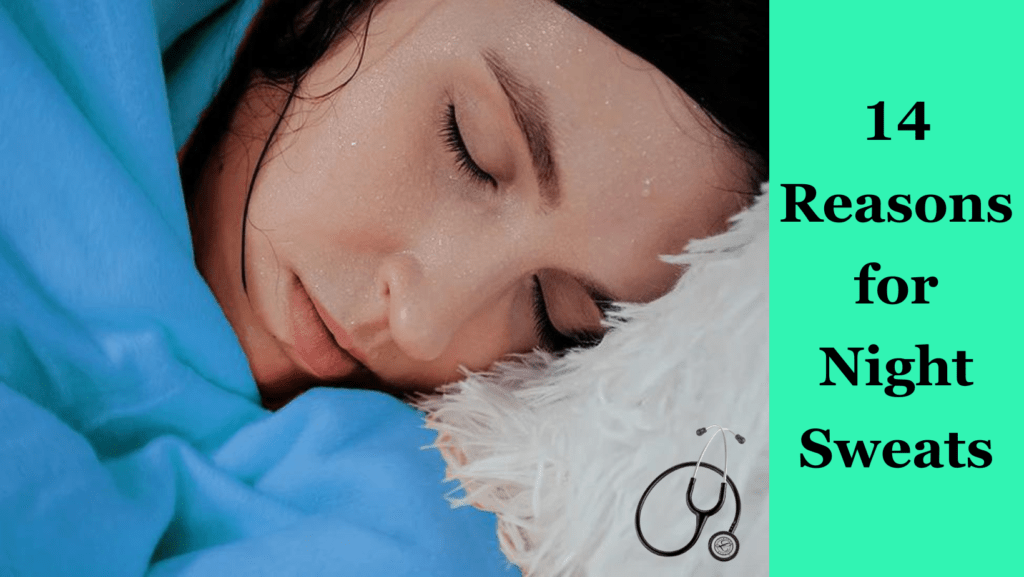
What are the causes of excessive night sweats? This comprehensive guide covers all possible reasons. Learn more about managing night sweats for a restful sleep.
14 Reasons for Night Sweats, You should be careful
Table of Contents
Introduction
Night sweat, though common, can be alarming and disrupt your sleep patterns. Understanding the underlying causes is essential for finding the right solution. In this guide, we’ll delve into all the reasons you might be having night sweat and provide valuable insights on when it’s imperative to seek medical advice.
Common Causes of Excessive Night Sweats
1. Hormonal Fluctuations
Night sweats can often be attributed to hormonal changes, especially in women approaching menopause. The fluctuating estrogen levels can trigger episodes of intense sweating during the night.
2. Infections and Fevers
Fighting off an infection or fever can lead to increased body temperature. This causes resulting sweats in the night. It’s the body’s natural response to help break the fever. In some other diseases like Tuberculosis night sweats occur so don’t forget the cause behind night sweat.
3. Medications
Certain medications, like antidepressants or hormone therapies, can cause night sweats as a side effect. If you suspect your medication might be the culprit, consult your healthcare provider for an alternative.
4. Anxiety and Stress
Heightened anxiety and stress levels can overstimulate the body, leading to increased sweating, even during sleep. Finding effective stress-reducing techniques can alleviate this symptom.
5. Sleep Environment
An overheated room, excessive bedding, or inadequate ventilation can contribute to sweating during sleep. Ensure your sleeping environment is comfortable and conducive to restful sleep.
6. Obstructive Sleep Apnea
This sleep disorder disrupts breathing patterns, leading to interrupted sleep and excessive sweating. Seeking treatment for sleep apnea can significantly improve your quality of sleep.
7. Menstrual Cycle
For some women, night sweats can occur in the days leading up to their menstrual cycle. Hormonal fluctuations during this time can lead to increased body temperature and sweating.
8. Certain Medical Conditions
Various medical conditions can be associated with night sweats. These may include diabetes, hyperthyroidism, and neurological disorders. If night sweats occur regularly and are accompanied by other concerning symptoms, it’s crucial to seek medical evaluation.
9. Alcohol or Substance Abuse Withdrawal
Individuals undergoing withdrawal from alcohol or certain substances may experience sweating at night as their body adjusts to the absence of these substances.
10. Idiopathic Hyperhidrosis
This condition involves excessive sweating that occurs without a clear reason. It can occur during both waking hours and at night.
11. Certain Cancers
Some types of cancer, such as lymphoma or leukemia, can lead to night sweats. These night sweats are often accompanied by other symptoms like unexplained weight loss and fatigue.
12. Neurological Disorders
Certain neurological conditions, such as autonomic dysreflexia or autonomic neuropathy, can disrupt the body’s temperature regulation, leading to sweats while sleeping.
13. Gastroesophageal Reflux Disease (GERD)
Night sweats can sometimes be a symptom of GERD, a condition in which stomach acid flows back into the esophagus, causing discomfort and potentially triggering sweating.
14. Tuberculosis (TB)
Night sweats can be a symptom of active TB. If night sweats are accompanied by other symptoms like coughing up blood or prolonged fever, it’s essential to seek medical attention promptly.
frequent urination and night sweats
Frequent Urination
Frequent urination, known as polyuria, involves the need to urinate more often than usual. Several factors can contribute to this condition:
– Diabetes: High blood sugar levels prompt the kidneys to produce more urine to expel excess glucose.
– Urinary Tract Infections (UTIs): Infections in the urinary system can cause irritation and a frequent need to urinate.
– Medications: Some drugs, especially diuretics, can increase urine production.
– Overactive Bladder: This condition involves involuntary bladder muscle contractions leading to frequent urination.
– Prostate Issues: In men, an enlarged prostate can press on the urethra, increasing the frequency of urination.
Night Sweats
Night sweats refer to excessive sweating during sleep, often soaking bedclothes and sheets. Common causes include:
– Menopause: Hormonal changes during menopause can result in hot flashes and night sweats.
– Infections: Diseases such as tuberculosis or other infections can lead to night sweats.
– Medications: Certain medications, including antidepressants and fever reducers, can cause excessive sweating at night.
– Hyperthyroidism: An overactive thyroid can increase metabolic rate, causing night sweats.
– Cancer: Certain cancers, such as lymphoma, may have night sweats as a symptom.
– Low Blood Sugar: Hypoglycemia can trigger sweating during the night, especially in people with diabetes on insulin or other medications.
If you experience frequent urination or night sweat, it’s essential to consult a healthcare provider to identify the underlying cause and receive appropriate treatment.
When to Consult a Doctor
Frequent and Severe Episodes
If your night sweats are recurrent and particularly severe, it’s crucial to seek medical advice. This may suggest an underlying medical condition that needs to be addressed.
Unexplained Weight Loss
Sweating while sleeping, coupled with unexplained weight loss could be a sign of a more serious underlying issue. Consulting a doctor promptly is imperative.
Additional Symptoms
If night sweats are accompanied by other concerning symptoms such as chest pain, fever, or persistent cough, it’s vital to consult a healthcare professional for a thorough evaluation.
Read also- How Fistula develops?
Homeopathic Medicines for Night Sweats: Alleviating Discomfort Naturally
Night sweat can be distressing, disrupting our sleep and impacting our daily lives. Homeopathy offers a gentle and holistic approach to address this concern. Here are some commonly used homeopathic remedies along with their key symptoms:
1. Lachesis
- Key Symptoms: Intense heat and burning sensations, especially around the neck. Sweats at the slightest exertion. Aggravated by tight clothing.
2. Sulphur
- Key Symptoms: Profuse and offensive sweating during night. Feeling of intense heat in the body. Restless and uneasy at night.
3. Sepia
- Key Symptoms: Sweats excessively, especially around the head and neck. Feeling of weakness and irritability. Improved by cool air.
4. Phosphorus
- Key Symptoms: Profuse and easy sweats. Often accompanied by a feeling of exhaustion and anxiety.
5. Belladonna
- Key Symptoms: Sudden and intense sweating, often with a fever. Face is red and hot.
6. Natrum Muriaticum
- Key Symptoms: Night sweats, particularly on the back. Averse to consolation, craves solitude.
7. Calcarea Carbonica
- Key Symptoms: Sweats heavily, especially on the head. Feels chilly and sluggish. Craves eggs and indigestible things.
8. Pulsatilla
- Key Symptoms: Sweats easily but without relief. Feels better in open air.
9. Arsenicum Album
- Key Symptoms: Sweating during night with great restlessness and anxiety. Feels chilly and weak.
10. Nux Vomica
- Key Symptoms: Sweats mostly on the upper body. Overindulgence in stimulants or rich food may be a causative factor.
How to Use Homeopathic Remedies:
- It’s advisable to consult a qualified homeopath for proper diagnosis and treatment. They will select the most appropriate remedy based on your specific symptoms, constitution, and medical history.
- Homeopathic remedies are typically taken in a diluted form (potency) and can be in the form of tablets, pellets, or drops.
Remember, individual responses to homeopathic remedies may vary, and it’s important to consult a healthcare professional for personalized guidance. If night sweat persist or worsen, seek prompt medical attention.
FAQs
1. Can certain foods trigger night sweats?
Spicy foods or those high in caffeine can sometimes lead to sweating while sleeping. It’s advisable to avoid consuming these close to bedtime.
2. Is it normal to experience sweating while sleeping during pregnancy?
Yes, hormonal changes during pregnancy can lead to night sweats. However, if they become excessively severe, consult your healthcare provider.
3. How can I improve my sleep environment to reduce night sweats?
Ensure your room is well-ventilated, maintain a comfortable temperature, and choose lightweight, breathable bedding materials.
4. Can sweating while sleeping is a symptom of a serious medical condition?
In some cases, yes. Night sweats, especially when accompanied by other concerning symptoms, can be indicative of an underlying medical issue. It’s important to seek medical advice.
5. Are there any natural remedies for night sweats?
Practicing relaxation techniques, maintaining a consistent sleep schedule, and avoiding triggering foods can help manage night sweats naturally.
6. When should I be concerned about night sweats in children?
While occasional night sweats in children are normal, if they become frequent or severe, it’s advisable to consult a pediatrician for a thorough evaluation.
Conclusion
Experiencing night sweats can be distressing, but understanding the potential causes and when to seek medical advice is essential for finding relief. By addressing the underlying issues, you can regain restful, uninterrupted sleep. Remember, if in doubt, consult a healthcare professional for personalized guidance.
=================================================================




